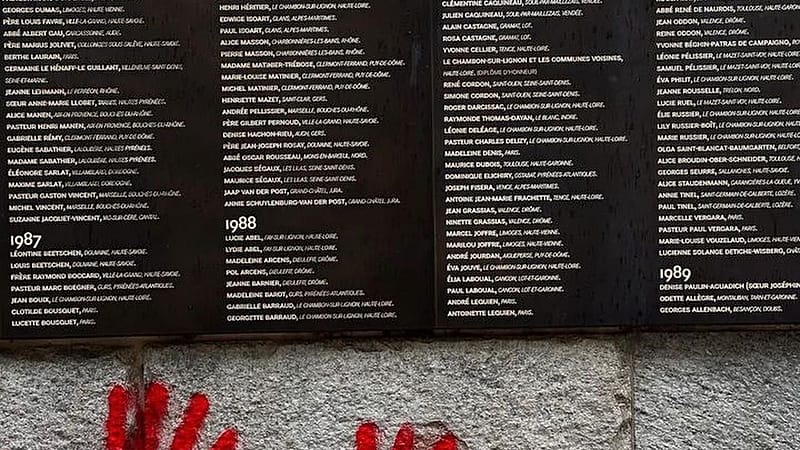Four Bulgarian nationals sentenced to prison for defacing Paris Holocaust Memorial with ‘red hands’

A Paris court has sentenced four Bulgarian men to prison for defacing the Paris Holocaust Memorial and several buildings with “red hand” graffiti in May 2024 — an act judges linked to a coordinated campaign of Russian foreign interference designed to inflame tensions in France.
The court found all four men guilty of aggravated vandalism and criminal conspiracy.
Nikolay Ivanov, described as one of the organisers, received four years in prison and a permanent ban from French territory.
Mircho Angelov, tried in absentia as he remains at large, was sentenced to three years with an arrest warrant issued.
Georgi Filipov, who carried out the act, and Kiril Milushev who filmed it, were each given two-year prison terms, also with permanent bans from France.
They must jointly pay €1 in symbolic damages to the Holocaust Memorial.
In its ruling, the court said the men had knowingly targeted a Jewish site and that the vandalism was “committed as part of a concerted and hostile operation intended to stir public opinion.”
While acknowledging evidence of foreign interference, the judges stressed that it did not lessen the defendants’ individual responsibility for the “considerable harm” caused.
The “red hand” motif — painted dozens of times — is seen as representing the bloodied hand that became infamous after the 2000 lynching of two Israeli soldiers in Ramallah during the Second Intifada, when one assailant displayed his blood-covered hands from a police station window to a cheering crowd.
The court found that the choice of location — the Shoah Memorial, a visible and clearly identifiable site — was deliberate.
It also considered what it described as a “context of interference that emerges very clearly from this case — acts committed within a coordinated operation carried out for a hostile purpose to stir public opinion and exploit existing divisions.”
The defendants denied any political motive, claiming they acted for money. Each now has ten days to appeal the ruling.
Hallmarks of Russian hybrid interference
The “red hand” graffiti, painted on the walls of the Shoah Memorial and several buildings across Paris in May 2024, immediately drew comparisons to a similar operation a few months before the incident, when blue Stars of David were sprayed on buildings in the French capital.
Investigators later traced that campaign to a pro-Russian Moldovan businessman, Anatoli Prizenko.
According to France’s domestic intelligence agency DGSI, both operations bore hallmarks of Russian hybrid interference — mixing on-the-ground acts of provocation with online amplification aimed at deepening social and political divides in France.
Investigators believe the incident at the Shoah Memorial was part of the same playbook. However, in court this week, the defendants provided little clarity about who directed or financed them.
Defendants provide little clarity on potential pro-Russian ties
Georgi Filipov was the first to testify, and told the court he painted the red hands in exchange for €1,000 to help pay child support for his nine-year-old son.
He said he was paid by a man named Mircho Angelov, the accomplice who is still at large, but did not provide any clarity over accusations of Russian involvement.
Kiril Milushev admitted to filming the graffiti at Angelov’s alleged instruction for €500.
Investigators say Milushev was also suspected of defacing a gravestone in Munich and of planning to post stickers in Zurich ahead of a Ukraine peace conference last year.
The third defendant, Nikolay Ivanov, denied any pro-Russian ties or knowledge of the political nature of the operation.
He acknowledged buying plane and bus tickets from Sofia to Paris and paying for hotel rooms, but said he was acting at Angelov’s request.
Defence lawyers argued their clients were motivated not by ideology but by poverty and a promise of “easy money”.
Georgi Filipov’s lawyer Martin Vettes acknowledged his client’s neo-Nazi tattoos as “an aggravating circumstance in itself,” but denied any antisemitic motive.
“He is a father who wanted to settle his unpaid child support,” he said, describing Filipov as a man in poor health who had been unable to work for months.
The case comes amid a rise in antisemitic and Islamophobic acts across France.
Last month, severed pigs’ heads were found near nine Paris-area mosques — five of them marked with President Emmanuel Macron’s name — prompting a separate investigation.

